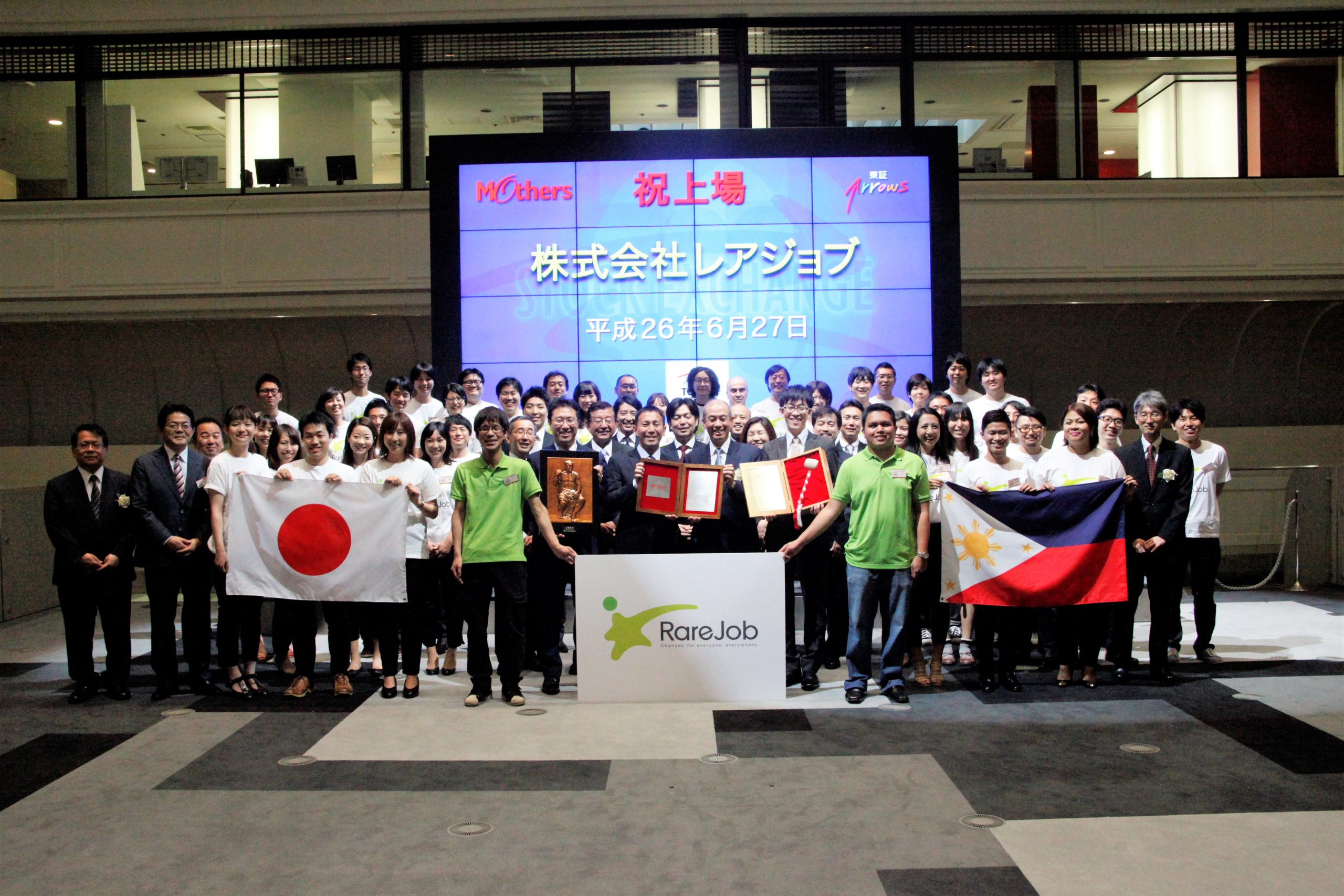#06 Facing big hurdle on the way to a stock listing. Essence of Valuation: Business Model and Growth Potential

On June 27, 2014, the company was listed on the Tokyo Stock Exchange Mothers.
Listing was a milestone climbing to a higher level as a company, although it seemed rocky road ahead.
IPO was one of the plans they envisioned after receiving its funding from Global Brain Inc.in 2008.
It was also significant as a means of visualizing trust in the industry and companies.
Although the online English conversation services industry itself has been growing, many of the operators are venture companies.
It was also the time that significant competitors emerged in the 2010s.
Earning trust as a company is essential for expanding business for corporate training and educational institutions.
Becoming the leading “listed company”in the online English conversation market was the key to further growth.
In addition, if the IPO of RareJob came true, it was expected that the common sense and prejudice of English education in Japan would be broken.
There was a negative image that a high tuition fee was essential for English education in the past.Japanese students preferred to learn English only from natives; English education was only held offline; the grammar-oriented educational curriculum was English education in Japan at the time.There were not a few barriers to overcome.
Therefore, the listed company’s birth was expected to increase recognition and trust in the online English conversation industry.
There are many benefits of being listed.
Nevertheless, it is said that about 30% of enterprises go through to the screening of securities companies even they start preparing for an IPO.Besides, it will be less than 10%, especially of TSE examinations.
To express the reason in a single word “because it is difficult.”
They need personnel, cost, and effort to manage budgets, disclose performance, and run everything in-house.
So why could RareJob go through this narrow gate and get listed on the stock market?
Did they have plenty of staff and money?
Is it because the preparation for the IPO went smoothly?
The facts were precicely the opposite.
When Fujita joined RareJob, only two management staff members were the cornerstone of IPO promotion. Moreover, the person in charge at that time had just left the company, so he was in a difficult position from the outset.
There was an incident in RareJob in 2012, suspicious of leaking personal information of students.
The service was stopped entirely, measures were taken, and the organization and security measures were drastically recreated.They had no cash-flow income, but needed funds to refund their students and advance compensation to Filipino tutors. Unless the business could continue, the IPO would not come true, so the funds were needed to be immediately raised from a bank.
In addition, IPOis not to be pursued solely by the person in charge.
It is essential to take steps to understand its significance company-wide and accept the new methods.
In the first place, IPO is significant growth for venture companies, however, at the same time, there is a risk of irreparable fatal injury if one step is wrong.
Because organizing the system and rules mean a high degree of the break to its freedom for quick judgment. For example, it is required to leave a trail of approval more than of its oral confirmation.
Feeling “tightened” can reduce one’s motivation and even change the company’s atmosphere and its culture.
Fujita was well aware of the examples of an IPO process, becoming a “venture killer.”
Once listed, both its work style and stance will change the company thoroughly. Why is this happening, what should the staff do?
To make each staff understood from the bottom of their hearts, the management team repeatedly explained its reason to the whole company, such as at the semi-annual business strategy presentation.
Overtime payment, which tends to be left in the gray zone, went back to the past two years and was paid in fullto all retirees.

New corporate and service logo in May 2013 as part of preparations for IPO.
With the idea of becoming a listed company that solves social issues and initiates reforms based on English conversation education
At the end of 2012, they decided to accelerate to the IPO while overcoming the incident and improving the internal system.
However, this time, Abenomics turned the yen into a sharp depreciation, and it gave a big blow again. For RareJob English conversation service receives the Japanese yen fee from the members, but pay the salary in pesos to Philippine tutors.
In other words, the depreciation of the yen causes pressure on the cost rate, out of the frying pan into the fire.
To absorb the rise in the cost rate, the management team revised the fee while reducing costs.
In February 2014, after they managed the foreign exchange risk and about to apply for listing on the Tokyo Stock Exchange, the Philippine side discovered tax problems. There were some issues with the Philippine taxation bureau because the transaction’s currency was denominated in yen, which caused a different understanding of taxation. Furthermore, the only tutors in RareJob at that time were IC-HBT(Independent Contractor/ Home Based Tutor: a telecommuter tutor commissioned to work, but withholding tax varies depending on whether the definition of the tutor, either as a general person or a professional.
To solve all of these tax issues, they have reviewed all audits over the past three years in just one month. And to be successfully listed, it was necessary to sort them out crystal clear.
They calculated the schedule, counting back from the date when the company could be listed across the fiscal year, and considering the general shareholder meeting in June. With all the audit company’s cooperation, they managed to apply to the Tokyo Stock Exchange in time. As a result of these measures, RareJob became a super-small IPO with “insolvency in the last quarter,” which might have been the first company in history.
Initiatives for the IPO provided an opportunity to reorganize and verbalize the intentions and attitudes toward realizing the group vision and the service mission.
All the stories so far are the footsteps of RareJob leading up to the IPO and the trajectory of the challenges overcoming numerous hurdles.
However, the actual reason for becoming a listed company was due to its distinctive business model and expectations for its growth.
In 2014, there were no listed companies in the online English conversation business.
In Japan, where the birthrate is declining, it is difficult for the education industry itself to be invested. Still, RareJob has a strong character as an “IT operator,” such as “crowdsourcing,” “C2C matching business,” and “connecting Japan and overseas.”
On the other hand, in the stock market, educational companies are often regarded as having difficulty in streamlining and scaling up their businesses because the ideals often become a shackle for business.
In this respect, Fujita believes that RareJob was recognized as a company that sets it apart from other educational companies and is expected to grow in different fields.
The group vision, “Chances for everyone, everywhere.” also reflects the stance.
“RareJob is a company that offers opportunities to anyone, wherever they are, nd the logic chose English education as one of the means.
“Efforts to improve the quality of English education” and “ essence of business model” coexist in different contexts.
The TSE Mothers market is a stock market centered on venture companies that are expected to grow. No matter how profitable they are, they won’t get approval for listing without growth expectations. The company’s management system is in place, and business models and solutions to social issues are also evaluated as targets for listing approval. RareJob was listed because of the English education market’s expectations for growth, a business model that creates value by connecting Japan and the Philippines, and the management system.
When the listing was approved after severe ups and downs, there were plenty of feelings in the heart of Nakamura, who had unexpectedly teared up.
Later, Nakamura recalled this moment, “when the CTO of the time was crying, the message video from the staff was also played, and I was thinking, “everyone worked so hard… thank you so much.”

Nonetheless, listing is by no means a goal, but a milestone that continues to drive further growth.
All they had to do was to stand at the start line to the higher stage, looking ahead and continuing to run again.
Of course, there was no way to know the future where stock price stagnated for a long time after this.
Even if they had known it, they would only think that they would face it and just deal with it because RareJob does nothing but put their feet on the ground and continue to take on life-sized challenges.


